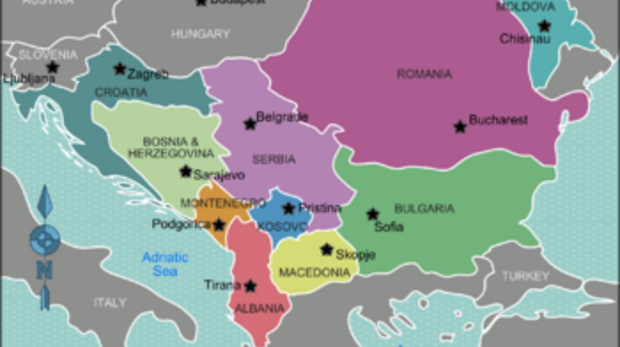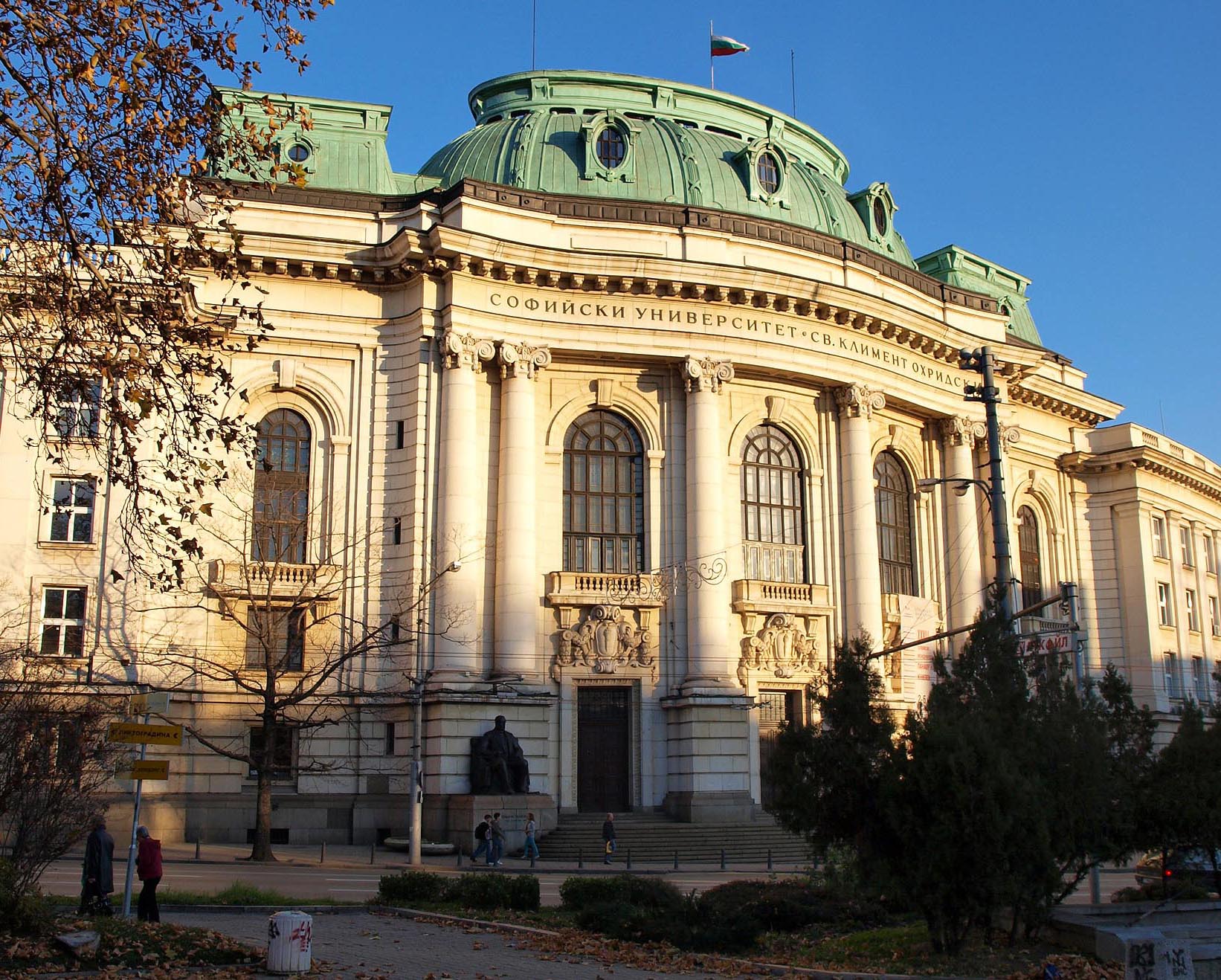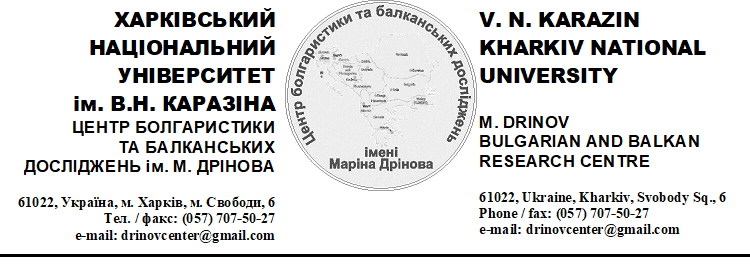Конференции
Конференции
 На 25 и 26 април 2014 г. в Софийския университет ще се проведе студентска научна конференция, посветена на 20-тата годишнина на специалност Балканистика. Можете да участвате с доклади в областта на балканското езикозонание, литература, история, култура и политика.
На 25 и 26 април 2014 г. в Софийския университет ще се проведе студентска научна конференция, посветена на 20-тата годишнина на специалност Балканистика. Можете да участвате с доклади в областта на балканското езикозонание, литература, история, култура и политика.
On behalf of the administration of the Department of General, Indo-European and Balkan Linguistics, Faculty of Slavic Studies, Sofia University „St. Kliment Ohridski“ we would like to invite you to the Student Scientific Conference dedicated to the 20th Anniversary of the Speciality Balkan Studies. It will be held from 25th to 27th April 2014 in Sofia University “St. Kliment Ohridski”. The participants will present paper works in the fields of the Balkan Linguistics, Literature, History, Culture and Politics.
Приложената заявка за участие трябва да бъде изпратена до 6 април на следния имейл: This email address is being protected from spambots. You need JavaScript enabled to view it.
The participants should fill in the Application form till 6th April 2014 (Saturday) and send it to the following e-mail: This email address is being protected from spambots. You need JavaScript enabled to view it..
Покана за участие / Invitation for participation
Заявка за участие / Application form
Борислава Иванова,
Председател на организационния комитет
Borislava Ivanova,
Chair of the Organizational Committee
доц. д-р Русана Бейлери
Катедра по общо, индоевропейско и балканско езикознание
Факултет по славянски филологии
Assoc. Prof. Dr. Russana Beyleri, PhD
Department Chair "General, Indo-European & Balkan Linguistics"
University of Sofia "St. Kliment Ohridski"
- Details
- Category: Конференции

THE FACULTY OF PHILOSOPHY
AND THE CULTURAL CENTRE OF SOFIA UNIVERSITY
in partnership with
Faculty of Philosophy, University of Guanajuato
Center for Philosophy, University of Tokyo
Faculty of Humanities, National University of “Kyiv-Mohyla Academy”
Department of Comparative Literature, Istanbul Bilgi University
ANNOUNCE
CALL FOR PAPERS
for an international interdisciplinary conference
THE ENLIGHTENMENT FROM A NON-WESTERN PERSPECTIVE
THEMATIC AREA OF THE CONFERENCE
The Enlightenment is an intellectual and philosophical high point of European historical development. It created powerful ideas and ideals – such as freedom, moral law, empowered, autonomous citizenship, fraternity and equality, representative democracy and tolerance, along with the ideas of progress and rational governmentality of society. At the same time, however, it also legitimized the Eurocentric domination of the world, serving as universal justification for all imperial conquests, for the destruction of local traditions, for ruthless technologization and exploitation of various non-European cultures and the forceful export of “civilization,” and “modernity”.
Today, the general consequences of the Enlightenment seem to be ambiguous: spread of literacy, scientific and economic progress, rule of law, emancipation movements along with centuries of colonial rule, violent political changes, disastrous world and local wars. The Enlightenment ideas have inspired several revolutions – political, philosophical and technological. They are the normative basis of democracy, yet of free market, technology and capitalism, too; they legitimize colonization, yet also anti-colonial and anti-capitalist resistance movements. Philosophers, writers and public figures of the Enlightenment, along with agents of mass education and literacy, spread across the world the standards of human dignity, sovereignty and emancipation, which are still enshrined in the legal and moral order of the “global present”. However, their dark doubles – eurocentrism, nationalism, racism, xenophobia, patriarchalism – are rooted in the very same intellectual, moral and political project and continue to shape our present as well.
All this shows that the Enlightenment is still very much a topical, controversial issue that has important political and intellectual implications; it raises questions and doubts – is Modernity a finished or still an unfinished project? In this strict sense, thinking about the Enlightenment and Modernity means not only thinking about our own origin; it means justifying our present and designing our future.
This conference aims not only to rethink those already known and inevitable contradictions, but also to de-Europeanize the history of the Enlightenment and its contemporary condition: to offer new perspectives from the “peripheries” which will, as we hope, re-examine the ambivalent legacy of the Enlightenment in a new heuristic way.
We propose the following possible topics:
The historical fate of the Enlightenment in non-European peripheries. Political, public and cultural effects and their development. Agents, channels, discourses, events, personalities.
Enlightenment in non-European peripheries/cultures/modernities: imported or autochthonous?
Are there specific contexts and traditions – local, pre-Enlightenment, indigenous; what is the specificity of the regional modernizations?
Internal “peripheral” discussions about Enlightenment ideas and ideals. What are the local variants of general disputes and controversies?
Reception of Eurocentric metanarratives of the Enlightenment and reception of the great philosophers and writers of the Enlightenment: their function, fate and local specificity in non-European contexts during colonialism.
The Enlightenment and post-colonial studies. Differences between non-European and non-Western perspectives. Revision of the stereotype “non-Western perspective.” Is “periphery” a good concept and a real alternative? The ideas and values of the Enlightenment in the contexts of colonization, post-colonial condition, self-colonization.
The problems of desecularization of the world and the critique of the Enlightenment. Do we need a revision of the secular world order?
What is the legacy of the Enlightenment in a global world where freedom, the power of reason, and human dignity are endangered? Can we defend and redefine those idea(l)s today?
What are the different types of anti-Enlightenment movements: ideas, personalities, debates, events? How do peripheries question and challenge the Eurocentric universalism of the Enlightenment?
What are the local answers to these global issues: what happened after the critique and crisis of the metanarratives, are there the new alternative political projects, how should one react to the crisis of the imagination and the absence of neoliberal alternatives?
End of the Enlightenment? The local and historical exhaustion of the Enlightenment wand of all its ideas, utopias, concepts and discourses. Are these local crises a sign of global decomposition of the Enlightenment project
Utopia and the legacy of the Enlightenment. What is the fate of utopia after the collapse of state communism, in the neoliberal present of “no alternative”? What are the ways and models of imagining the future today?
PARTICIPATION TERMS
The conference will be held from 23 to 27 May 2016 in Bulgaria. The main part of the conference will take place at Sofia University, Sofia, on 23, 24 and 25 May. The second part (the Doctoral School) will be held in the rest-house in the area of Gyolechitsa in the Rila Mountain on 25, 26 and 27 May. The official language of the conference will be English.
The expected participants should be experts in philosophy, cultural studies, cultural history, anthropology, sociology, literary and art criticism and other branches of humanities. The call is also open for young scholars and PhD students who will take part in the Doctoral School, led by prominent scholars.
Application deadline: 1 February 2016
Applications (accompanied by a topic within the thematic areas of the conference, a 300-word abstract, a short bibliography and a scholarly CV) should be sent via e-mail to This email address is being protected from spambots. You need JavaScript enabled to view it.
The Conference Committee (consisting of senior scholars, representatives of the partner universities) will select and announce the final list of the participants.
The Host organization will cover the costs of accommodation for all selected participants (invited keynote speakers, senior speakers and PhD students). The travel costs should be covered by the participants.
- Details
- Category: Конференции

Workshop “New Linguistic Models in the Human Sciences”
Organized by the Sofia Literary Theory Seminar, and the Literary Theory Department at the Faculty of Slavic Philology, University of Sofia “St. Kliment Ohridski”
July 29, 2023
Sofia 1504, 15 Tsar Osvoboditel Blvd
University of Sofia, Faculty of Slavic Studies, Room 137
Programme
Morning Session
11:00 Opening
11:10~11:50 Lidiya Shamova (Tokyo College, University of Tokyo) – “Music and Language”
11:50~12:30 Discussion
12:30~14:00 Lunch Break
Afternoon Session
14:00~14:40 Bogdana Paskaleva (University of Sofia) – “Materiality of Language in Ferdinand de Saussure”
14:40~15:20 Discussion
15:20 Closing words
- Details
- Category: Конференции

INVITATION
Dear Colleagues,
The Department of Slavic Linguistics and the Department of Slavic Literatures at Sofia University St. Kliment Ohridski are pleased to invite you to participate in The Fourteenth International Slavic Studies Conference, which will be held from 26th to 28th April 2018 at the Conference Halls of Sofia University St. Kliment Ohridski. The topic of The Fourteenth International Slavic Studies Conference is:
The Stereotype in the Slavic Languages, Literatures and Cultures
We would kindly ask you to head your application for the following fields:
I. Linguistics
Please, send the filled Application form to: This email address is being protected from spambots. You need JavaScript enabled to view it.
II. Literature
III. Culturology
IV. Anthropology
V. Folklore
Please, send the filled Application form to: This email address is being protected from spambots. You need JavaScript enabled to view it.
Contributors are invited to deliver 15-minute presentations of their papers. The working languages of the Conference are all Slavic languages and English.
The publishing of the Conference Proceedings is planned. The full-text manuscripts exceeding the limit of 22000 characters (with spaces) will not be accepted. The technical instructions will be sent to you additionally.
The Conference fee is 60 BGN. Travel and accommodation expenses should be covered by the participants.
Participation in absentia is not accepted.
We would like to receive your Application until 31st January 2018.
|
Organizational Committee: |
Programme Committee: |
|
Prof. Dr.Sc. Boško Suvajdžić (Serbia) Prof. Dr.Sc. Zvonko Kovač (Chroatia) Prof. Dr.Sc. Ludmila Uhlířová (Czech Republic) Prof. Dr.Sc. Lucian Suchanek (Poland) Prof. Dr.Sc. Guiseppe dell’Agata (Italy) Prof. Dr.Sc. Panayot Karagyozov (Bulgaria) Assoc. Prof. Dr.Sc.Margarita Mladenova (Bulgaria) |
Assoc. Prof. Tsvetanka Avramova, PhD. Assoc. Prof. Dilyana Dencheva, PhD. Assist. Prof. Rositsa Stefcheva, PhD. Assist. Prof. Emiliya Makedonska, PhD. Assist. Prof. Diana Ivanova, PhD. Assist. Prof. Vladimir Kolev, PhD. Assist. Prof. Ticha Boncheva Boryana Tsvetkova Christian Yanev Lilia Zheleva Velimira Bozhilova |
Head of Department Head of Department
of Slavic Linguistics: of Slavic Literatures:
(Assoc. Prof. Albena Stamenova, PhD.) (Assoc. Prof. Ina Hristova, PhD.)
Sofia, 20th November 2017
- Details
- Category: Конференции

ИНФОРМАЦИОННО ПИСМО № 1
Харковски национален университет «В. Н. Каразин»
Център по българистика и балкански изследвания „Марин Дринов“
Исторически и Филологически факултети
Национална академия на науките на Украйна
Украински комитет на славистите
Институт на украинската археография и изворознание «М. С. Грушевски»
Институт за изкуствознание, фолклористика и етнология «М. Т. Рилски»
Институт за езикознание «О. О. Потебня»
Българска академия на науките
Институт за исторически изследвания
Институт по етнология и фолклористика с Етнографски музей
Център за перспективни изследвания в София
Уважаеми колеги,
XI ДРИНОВСКИ ЧЕТЕНИЯ на тема: „Украйна и нейните съседи: проблеми на етногенезата, изграждането на нациите и международните отношения в Централна и Източна Европа (от Средновековието до епохата на глобализацията)“ ще се проведат от Харков и София присъствено и онлайн на 14-15 ноември 2024 г. и ще бъдат във връзка с XVII Международен конгрес на славистите в Париж.
Предвижда се работа на следните секции и „кръгли маси“:
- Славяните и техните съседи в Карпатско-Черноморския регион през ранното средновековие: етнополитическа и социална история.
- Проблеми на държавното строителство и геополитика в средновековната „нова“ Европа: Рус до и след монголското нашествие.
- Украинските земи в състава на Великото княжество Литовско и Руско / Жеч Посполита: проблеми на религиозната, етническа и политическа идентичност.
- „Нацията на казаците“ на кръстопът: ранномодерната Украинска държава в оковите на Московското царство и Руската империя.
- Nation building на имперската епоха: надпреварата на „националните проекти“ в европейски контекст (краят на XVIII – началото на ХХ век)
- Националноосвободителната революция през 1917–1921 г. и съветският проект на “дружба на народите”: последиците за Украйна.
- Възраждането на националната държавност и формирането на политическата нация: Украйна в международната система на координатите (краят на ХХ в. – първата четвърт на XXI в.).
- Кръгла маса: “Европейска мобилност на национални малцинства и нови диаспори: съвременно състояние и перспективи” .
- Кръгла маса: “Междуславянските езикови връзки: история и съвременност”.
Заявки и резюмета на докладите (в рамките на 1 страница А4 – до 2000 знака с интервали) се приемат до 15 септември 2024 г. през google форма: https://forms.gle/rrXMzvAT4GXJTBc46
Работните езици на XI Дриновски четения са украински, български, полски и английски. Предвижда се публикуването на материалите на конференцията в XVIII том на „Дриновски сборник/Дриновський збірник” – годишник на БАН и Харковския национален университет “В. Н. Каразин” (исторически въпроси) и във „Вісник Харківського національного університету імені В. Н. Каразіна“ (серия „Філологія“).
Организационният комитет си запазва правото на подбор при доклади, които не отговарят на темата на научния форум.
Телефони за връзка: +380959099334 – Viber;
+359895795031 – България ( доц. д-р Сергий Страшнюк);
+ 380678014799 – Украйна (внс дфн Вероника Ярмак).
ОРГАНИЗАЦИОНЕН КОМИТЕТ
- Details
- Category: Конференции
Page 3 of 33